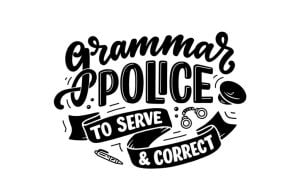There are two variants of English, namely American and British English. It is useful to know the differences between them, as they do not only concern vocabulary, but grammar as well.
Is or are?
It would seem obvious that we use are in the case of mass nouns that refer to a collective, e.g. group, public, company, class, etc. In British English, it does not matter whether we choose are or is, but in American English, we do not have this choice, because the correct verb to put next to them is is.
The company has passed the new law. [singular]
The company are debating the matter. [plural]
The class was working on some maths problems. [singular]
The class were working on some maths problems. [plural]
Use of prepositions
Prepositions are one of the most problematic issues, regardless of the variant we use. In British English, we use at with different expressions very often, both when it comes to the names of holidays, and also the time (at six o’clock or at the weekend). In addition, this preposition is used when speaking about institutions and universities, e.g. at university. In American English, the preposition on is used whenever we talk about the weekend and the holidays, so we will say on the weekend and on Christmas. Another troublesome preposition is to, which is used after the verb in British, e.g. listen to sb. However, in the American variant, this preposition can be omitted.
Use of delexical verbs
In English, delexical verbs are juxtaposed with a noun to describe an action. For example, we use the verb have in the phrase have a shower. In American, however, the verb take is used instead of ‘have’ in this context, so the whole phrase would be, for example, take a shower.
Modal verbs
Differences regarding the grammar of the two variants are also noticeable in the case of modal verbs. In British English, people say needn’t. In American English, on the other hand, such an expression is practically unheard of, and simply the form don’t/doesn’t need is used. British English uses the verb shall as a way of talking about the future, which becomes a synonym for will. In American English, it is quite different as shall is not used, and will is practically always applied. Depending on the meaning, shall can also be replaced by ‘should’ in the American dialect. In British English shall I/we is used when we are interested in knowing someone’s opinion or seeking advice.
You shall obey the rules. – should
I shall go now. – will
Shall we dance? – suggestion
I will do as you say.
What should we do now?
Past Simple and Present Perfect tenses
There are also differences in the use of tenses. Which tense to use if we want to say that something happened recently? British people will use Present Perfect, while Americans go for Past Simple.
She only recently discovered the truth. – Past Simple
Have you seen Harry recently? – Present Perfect
Past tense forms
The forms of the past tense in British English or American English also vary. They often take the irregular form with the ending -t (e.g. learnt), and in American the regular form with the ending -ed (e.g. learned).
Which option is more difficult?
It is hard to judge which version is more difficult, as both require learning specific rules. Thus, this is the greatest difficulty, as is practicing these skills.






